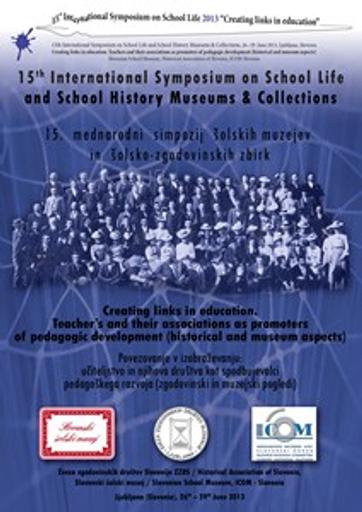/
Dogodki
/
Konference
Gustav Adolf Lindner and the Society for Scientific Pedagogy


To delo avtorja Edvard Protner je ponujeno pod Creative Commons Priznanje avtorstva-Nekomercialno-Brez predelav 4.0 Mednarodna
Datoteke (1)
Opis
Gustav Adolf Lindner (1828-1887) stand as one of the most significant pedagogical figures from the second half of the 19th century in the Habsburg monarchy and wider area. Although he was born in the Czech Republic, where he also studied and worked as a teacher, his liberal views meant he was forced to seek employment elsewhere. In 1854, his career path brought him to Slovenia, where he taught at the classical high school in Celje until 1872. During that period, he wrote three textbooks in the field of philosophical propaedeutics, which were prescribed in classical high schools throughout the monarchy and other texts that were considered influential. In 1870 he became a member of the governing body of the Society for Scientific Pedagogy (Verein für wissenschaftliche Pädagogik), which Tuiscon Ziller had founded two years previously in Leipzig. The society was the intellectual centre of Herbartian pedagogy – the pedagogical doctrine that dominated until the turn of the century and remained influential during the two wars. Lindner was a rather individual representative of Herbartism and because of differences of opinion with other leading figures, he soon left the association. Regardless, Lindner's presence in Celje and his international profile represent a link to the leading pedagogical theory of the time, which far surpassed the level of domestic pedagogical thought.
Metapodatki (12)
- identifikatorhttps://hdl.handle.net/11686/37728
- naslov
- Gustav Adolf Lindner and the Society for Scientific Pedagogy
- Gustav Adolf Lindner in Društvo za znanstveno pedagogiko
- ustvarjalec
- Edvard Protner
- soavtor
- Jan Šimek (mod.)
- predmet
- zgodovina
- šolstvo
- muzej
- history
- school system
- museum
- opis
- Gustav Adolf Lindner (1828-1887) velja za enega najbolj markantnih pedagogov druge polovice 19. stoletja na področju Habsburške monarhije in širše. Rojen je bil na Češkem, kjer je tudi študiral in se zaposlil kot učitelj, vendar je moral zaradi liberalnih pogledov iskati službo drugje. Leta 1854 ga je poklicna pot privedla v Slovenijo, kjer je kot učitelj na gimnaziji v Celju ostal do leta 1872. V tem času je napisal tri učbenike s področja filozofske propedevtike, ki so bili na gimnazijah v monarhiji splošno uveljavljeni in še nekatere odmevne tekste. Leta 1870 je postal član predsedstva Društva za znanstveno pedagogiko (Verein für wissenschaftliche Pädagogik), ki ga je dve leti pred tem v Leipzigu ustanovil Tuiscon Ziller. Gre za društvo, ki je bilo intelektualni center herbartistične pedagogike – pedagoške doktrine, ki je prevladovala do preloma stoletja in ohranjala svojo moč še med obema vojnama. Lindner velja za precej samosvojega predstavnika herbartizma in je zaradi razhajanj z vodilnimi predstavniki iz društva kmalu izstopil. Ne glede na to pa prisotnost Lindnerja v Celju in njegova takratna mednarodna dejavnost pomenita stik z najodličnejšo pedagoško teorijo tistega časa, ki je daleč presegal nivo pedagoške misli v domačem okolju.
- Gustav Adolf Lindner (1828-1887) stand as one of the most significant pedagogical figures from the second half of the 19th century in the Habsburg monarchy and wider area. Although he was born in the Czech Republic, where he also studied and worked as a teacher, his liberal views meant he was forced to seek employment elsewhere. In 1854, his career path brought him to Slovenia, where he taught at the classical high school in Celje until 1872. During that period, he wrote three textbooks in the field of philosophical propaedeutics, which were prescribed in classical high schools throughout the monarchy and other texts that were considered influential. In 1870 he became a member of the governing body of the Society for Scientific Pedagogy (Verein für wissenschaftliche Pädagogik), which Tuiscon Ziller had founded two years previously in Leipzig. The society was the intellectual centre of Herbartian pedagogy – the pedagogical doctrine that dominated until the turn of the century and remained influential during the two wars. Lindner was a rather individual representative of Herbartism and because of differences of opinion with other leading figures, he soon left the association. Regardless, Lindner's presence in Celje and his international profile represent a link to the leading pedagogical theory of the time, which far surpassed the level of domestic pedagogical thought.
- založnik
- Inštitut za novejšo zgodovino
- Zveza zgodovinskih društev Slovenije
- Slovenski šolski muzej
- ICOM Slovenija
- datum
- 2013
- 28. 06. 2013
- tip
- video
- jezik
- Angleščina
- jeDelOd
- pravice
- licenca: ccByNcNd
